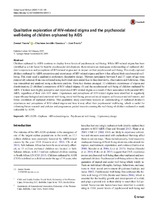Qualitative exploration of HIV-related stigma and the psychosocial well-being of children orphaned by AIDS
Abstract
Children orphaned by AIDS continue to display lower levels of psychosocial well-being. While HIV-related stigma has been
identified as a risk factor for healthy psychosocial development, there remains an inadequate understanding of orphaned children’s
experiences and perceptions of HIV-related stigma and its impact on their psychosocial well-being. This study explored
children orphaned by AIDS perceptions and experiences of HIV-related stigma and how it has affected their psychosocial wellbeing.
This study used a qualitative exploratory descriptive design. Thirteen participants between 8 and 17 years of age were
purposively selected. Data was collected using individual open-ended face-to-face interviews, observations and field notes. Data
was transcribed and analysed using a thematic analysis. Three key themes emerged, (1) children’s experiences of stigma and
discrimination; (2) children’s perceptions of HIV-related stigma; (3) and the psychosocial well-being of children orphaned by
AIDS. Children were highly perceptive and experienced HIV-related stigma as a result of their association with parental HIV/
AIDS, regardless of their own HIV status. Experiences and perceptions of HIV-related stigma were identified to negatively
impact the psychological and emotional well-being, social well-being, perceived social support, self-concept and self-esteem, and
future orientation of orphaned children. This qualitative study contributes towards an understanding of orphaned children’s
experiences and perceptions of HIV-related stigma and how it may affect their psychosocial well-being, which is useful for
informing future research and policies and programmes guided towards ensuring the well-being of children orphaned or made
vulnerable by AIDS.

